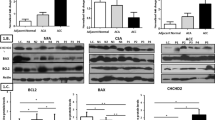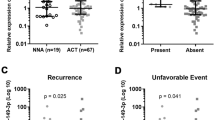Abstract
As an uncommon malignancy in the adrenal gland, adrenocortical carcinoma (ACC) is characterized by thorny diagnosis and poor clinical outcome, necessitating innovative treatment strategies. Sirtuin 6 (SIRT6), a tumor suppressor, modulates aerobic glycolysis of malignant cells and has an impact on tumorigenesis. This study focused on investigating SIRT6 expression in ACC and how it generates cancer phenotypes. SIRT6 expression was inhibited in ACC tissues according to western blotting, real-time polymerase chain reaction, and immunohistochemistry. MTT assay, TUNEL assay, and flow cytometry were performed to evaluate the contribution of SIRT6 to cell invasion, proliferation, death, and migration. It was shown that SIRT6 knockdown promoted cell invasion, proliferation, and migration, and inhibited cell death. Moreover, it was found that SIRT6 knockdown upregulated TLR4 and reinforced phosphorylation of the nuclear transcription factor-kappa B (NF-κB) subunit p65 as well as inhibitor of nuclear factor kappa-B kinase. Additionally, SIRT6 knockdown significantly enhanced expression of calcitonin gene-related peptide as well as transient receptor potential vanilloid subtype 1. It also reinforced reactive oxygen species generation. Overall, our research findings demonstrate that SIRT6 serves as a tumor suppressor via regulation of the NF-κB pathway, which could offer an innovative strategy to treat ACC.






Similar content being viewed by others

References
Gara SK, Lack J, Zhang L, Harris E, Cam M et al (2018) Metastatic adrenocortical carcinoma displays higher mutation rate and tumor heterogeneity than primary tumors. Nat Commun 9:4172
Wu K, Liu Z, Liang J, Tang Y, Zou Z et al (2018) Laparoscopic versus open adrenalectomy for localized (stage 1/2) adrenocortical carcinoma: experience at a single, high-volumecenter. Surgery 164:1325–1329
Fassnacht M, Dekkers OM, Else T, Baudin E, Berruti A et al (2018) European Society of Endocrinology Clinical Practice Guidelines on the management of adrenocortical carcinoma in adults, in collaboration with the European Network for the Study of Adrenal Tumors. Eur J Endocrinol 179:G1–G46
Miller BS (2018) Changes in the evaluation and management of adrenocortical carcinoma. Ann Surg Oncol 25:3413–3415
Schimmack S, Strobel O (2018) [Resection strategies for adrenocortical carcinoma]. Chirurg 90:9–14
Xu YZ, Zhu Y, Shen ZJ, Sheng JY, He HC et al (2011) Significance of heparanase-1 and vascular endothelial growth factor in adrenocortical carcinoma angiogenesis: potential for therapy. Endocrine 40:445–451
Ribeiro TC, Jorge AA, Almeida MQ, Mariani BM, Nishi MY et al (2014) Amplification of the insulin-like growth factor 1 receptor gene is a rare event in adrenocortical adenocarcinomas: searching for potential mechanisms of overexpression. Biomed Res Int. https://doi.org/10.1155/2014/936031
Zhang Q, Tu W, Tian K, Han L, Wang Q et al (2018) Sirtuin 6 inhibits myofibroblast differentiation via inactivating transforming growth factor-beta1/Smad2 and nuclear factor-kappaB signaling pathways in human fetal lung fibroblasts. J Cell Biochem 120:93–104
Rahnasto-Rilla M, Tyni J, Huovinen M, Jarho E, Kulikowicz T et al (2018) Natural polyphenols as sirtuin 6 modulators. Sci Rep 8:4163
Liu F, Bu HF, Geng H, De Plaen IG, Gao C et al (2017) Sirtuin-6 preserves R-spondin-1 expression and increases resistance of intestinal epithelium to injury in mice. Mol Med 23:272–284
Hu Y, Tao X, Han X, Xu L, Yin L et al (2018) MicroRNA-351-5p aggravates intestinal ischaemia/reperfusion injury through the targeting of MAPK13 and Sirtuin-6. Br J Pharmacol 175:3594–3609
Kim JH, Lee JM, Kim JH, Kim KR (2018) Fluvastatin activates sirtuin 6 to regulate sterol regulatory element-binding proteins and AMP-activated protein kinase in HepG2 cells. Biochem Biophys Res Commun 503:1415–1421
Mohamad NN, Zainuddin A, Shamsuddin S (2018) Emerging roles of Sirtuin 6 in Alzheimer’s disease. J Mol Neurosci 64:157–161
Wang Y, Pan T, Wang H, Li L, Li J et al (2017) Overexpression of SIRT6 attenuates the tumorigenicity of hepatocellular carcinoma cells. Oncotarget 8:76223–76230
Bai L, Lin G, Sun L, Liu Y, Huang X et al (2016) Upregulation of SIRT6 predicts poor prognosis and promotes metastasis of non-small cell lung cancer via the ERK1/2/MMP9 pathway. Oncotarget 7:40377–40386
Sebastian C, Zwaans BM, Silberman DM, Gymrek M, Goren A et al (2012) The histone deacetylase SIRT6 is a tumor suppressor that controls cancer metabolism. Cell 151:1185–1199
Fukuda T, Wada-Hiraike O, Oda K, Tanikawa M, Makii C et al (2015) Putative tumor suppression function of SIRT6 in endometrial cancer. FEBS Lett 589:2274–2281
Lin Z, Yang H, Tan C, Li J, Liu Z et al (2013) USP10 antagonizes c-Myc transcriptional activation through SIRT6 stabilization to suppress tumor formation. Cell Rep 5:1639–1649
Marx C, Bornstein SR, Wolkersdorfer GW (2000) Cellular immune-endocrine interaction in adrenocortical tissues. Eur J Clin Invest 30(Suppl 3):1–5
Li N, Mao D, Cao Y, Li H, Ren F et al (2018) Downregulation of SIRT6 by miR-34c-5p is associated with poor prognosis and promotes colon cancer proliferation through inhibiting apoptosis via the JAK2/STAT3 signaling pathway. Int J Oncol. https://doi.org/10.3892/ijo.2018.4304
Zhu B, Yan Y, Shao B, Tian L, Zhou W (2018) Downregulation of SIRT6 is associated with poor prognosis in patients with non-small cell lung cancer. J Int Med Res 46:1517–1527
Ran LK, Chen Y, Zhang ZZ, Tao NN, Ren JH et al (2016) SIRT6 overexpression potentiates apoptosis evasion in hepatocellular carcinoma via BCL2-associated X protein-dependent apoptotic pathway. Clin Cancer Res 22:3372–3382
Lin H, Hao Y, Zhao Z, Tong Y (2017) Sirtuin 6 contributes to migration and invasion of osteosarcoma cells via the ERK1/2/MMP9 pathway. FEBS Open Bio 7:1291–1301
Zhou J, Wu A, Yu X, Zhu J, Dai H (2017) SIRT6 inhibits growth of gastric cancer by inhibiting JAK2/STAT3 pathway. Oncol Rep 38:1059–1066
Ioris RM, Galie M, Ramadori G, Anderson JG, Charollais A et al (2017) SIRT6 suppresses cancer stem-like capacity in tumors with PI3K activation independently of its deacetylase activity. Cell Rep 18:1858–1868
Van Meter M, Mao Z, Gorbunova V, Seluanov A (2011) SIRT6 overexpression induces massive apoptosis in cancer cells but not in normal cells. Cell Cycle 10:3153–3158
Lee N, Ryu HG, Kwon JH, Kim DK, Kim SR et al (2016) SIRT6 depletion suppresses tumor growth by promoting cellular senescence induced by DNA damage in HCC. PLoS ONE 11:e165835
Khurana N, Sikka SC (2018) Targeting crosstalk between Nrf-2, NF-kappaB and androgen receptor signaling in prostate cancer. Cancers (Basel) 10:352
Nicolini A, Ferrari P, Diodati L, Carpi A (2018) Alterations of signaling pathways related to the immune system in breast cancer: new perspectives in patient management. Int J Mol Sci 19:2733
Zhao H, Xu J, Wang Y, Jiang R, Li X et al (2018) Knockdown of CEACAM19 suppresses human gastric cancer through inhibition of PI3K/Akt and NF-kappaB. Surg Oncol 27:495–502
Liu F, Cheng L, Xu J, Guo F, Chen W (2018) miR-17-92 functions as an oncogene and modulates NF-kappaB signaling by targeting TRAF3 in MGC-803 human gastric cancer cells. Int J Oncol 53:2241–2257
Wang Z, Lu Y, Sheng B, Ding Y, Cheng X (2018) Catalpol inhibits TGF-beta1-induced epithelial-mesenchymal transition in human non-small-cell lung cancer cells through the inactivation of Smad2/3 and NF-kappaB signaling pathways. J Cell Biochem. https://doi.org/10.1002/jcb.27535
Tong HB, Zou CL, Qin SY, Meng J, Keller ET et al (2018) Prostate cancer tends to metastasize in the bone-mimicking microenvironment via activating NF-kappaB signaling. J Biomed Res 32:343–353
Staal J, Beyaert R (2018) Inflammation and NF-kappaB signaling in prostate cancer: mechanisms and clinical implications. Cells. https://doi.org/10.3390/cells7090122
Tang C, Zhu G (2018) Classic and novel signaling pathways involved cancer: targeting the NF-kappaB and Syk signaling pathways. Curr Stem Cell Res Ther. https://doi.org/10.2174/1574888X13666180723104340
Harquail J, LeBlanc N, Landry C, Crapoulet N, Robichaud GA (2018) Pax-5 Inhibits NF-kappaB activity in breast cancer cells through IKKepsilon and miRNA-155 effectors. J Mammary Gland Biol Neoplasia 23:177–187
Tegowski M, Baldwin A (2018) Noncanonical NF-kappaB in cancer. Biomedicines 6(2):66
Liu B, Xu T, Xu X, Cui Y, Xing X (2018) Biglycan promotes the chemotherapy resistance of colon cancer by activating NF-kappaB signal transduction. Mol Cell Biochem 449:285–294
House CD, Grajales V, Ozaki M, Jordan E, Wubneh H et al (2018) IKappaKappaepsilon cooperates with either MEK or non-canonical NF-kB driving growth of triple-negative breast cancer cells in different contexts. BMC Cancer 18:595
Funding
This research did not receive any specific grant from funding agencies in the public, commercial, or not-for-profit sectors.
Author information
Authors and Affiliations
Corresponding author
Ethics declarations
Conflict of interest
The authors declare that they have no conflict of interest.
Ethical approval
This study has been approved by the Ethics Committee of the West China Hospital, Sichuan University.
Informed consent
Informed consent was obtained from all individual participants included in the study.
Additional information
Publisher’s Note
Springer Nature remains neutral with regard to jurisdictional claims in published maps and institutional affiliations.
Rights and permissions
About this article
Cite this article
Wu, X., Tian, H., Xue, L. et al. SIRT6 abrogation promotes adrenocortical carcinoma through activation of NF-κB signaling. Mol Cell Biochem 458, 1–10 (2019). https://doi.org/10.1007/s11010-019-03525-8
Received:
Accepted:
Published:
Issue Date:
DOI: https://doi.org/10.1007/s11010-019-03525-8



